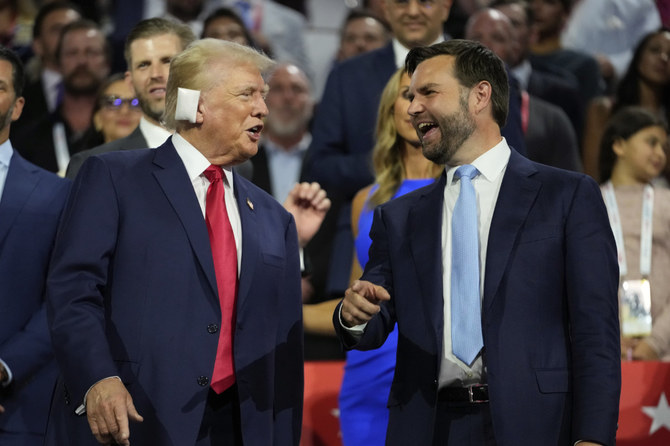WASHINGTON: Donald Trump’s choice of populist Ohio Senator J.D. Vance as his vice presidential running mate provides more evidence of what would be a tough US stance on China in a second Trump administration, analysts said.
Vance, who shortly after his selection on Monday called China the “biggest threat” facing the United States, shares the Republican candidate’s belief that China’s rise as the world’s factory ruined America’s manufacturing sector.
Speaking to Fox News on Monday, Vance, who has opposed US funding for Ukraine’s defense against Russia’s invasion, said Trump would prioritize a negotiated end to that crisis so the US could focus on the “real issue” of China.
“That’s the biggest threat to our country and we are completely distracted from it,” Vance said of China.
The prospect of intensifying trade tensions under a second Trump administration has hit Chinese markets hard in the past two days, with some analysts pointing to the selection of Vance as presidential running mate as a reason.
His comments also triggered a response from Beijing, which generally seeks to distance itself from political rhetoric around US presidential campaigns.
“We are always opposed to the US making China an issue in elections,” Foreign Ministry spokesperson Lin Jian told reporters in Beijing on Tuesday.
Trump launched a trade war against China while in the White House, and as a candidate this year the former president has suggested he would impose tariffs of 60 percent or higher on all Chinese goods.
In the US political system, vice presidents typically have limited direct influence on foreign policy. Vance, 39, has acknowledged the support role he would play to a President Trump.
“You’ve got to be a person he can trust, he can rely on, to actually advance the agenda,” he said of the vice presidency.
After serving as a Marine, attending Yale Law School and working as a venture capitalist in San Francisco, Vance rose to prominence thanks to his 2016 book “Hillbilly Elegy,” in which he explored the problems of his hometown and attempted to explain Trump’s popularity among impoverished white Americans.
“Vance’s remarks yesterday were completely in accordance with Trump’s stated views and Trump likes it that way,” said Jeff Moon, a trade consultant and a former assistant US trade representative for China.
Aligned with congressional Republicans
On China, Vance will be in good company with the Republican leadership in Congress.
House Speaker Mike Johnson has also labeled the country the top foreign threat to the US, and said Beijing exploited “every nook and cranny in our financial and economic systems.”
Vance has referred to letting China into the World Trade Organization in 2001 as a “disaster.”
There is broad bipartisan agreement in Washington on China. Democratic President Joe Biden has largely kept his predecessor’s tariffs in place, and ratcheted up others.
Trump has sought to take credit for the tariff policy as the two prepare for a rematch in November’s presidential election and Republicans have criticized efforts by Biden to ease tensions with Beijing in the past year.
Vance has highlighted America’s battle with fentanyl, the deadly synthetic opioid made with chemicals heavily produced and exported from China, saying Trump would be the president to stop it.
Jeremy Levin, CEO of OVID industries and a former chairman of the Biotechnology Innovation Organization (BIO) lobby group, said Vance’s selection cemented industry perceptions that a Trump administration would seek to limit the US operations of Chinese firms in strategic sectors.
“Without a question, they will pursue it,” Levin said.
Cleo Paskal, a non-resident senior fellow at the Foundation for Defense of Democracies think tank, said Vance’s comments about China were telling.
“His book chronicles the gutting of US manufacturing and drug addiction, both of which were at least exacerbated by the PRC (People’s Republic of China),” she said.
“There will be many in a President Trump administration that assume the PRC is out to severely weaken the United States.”














